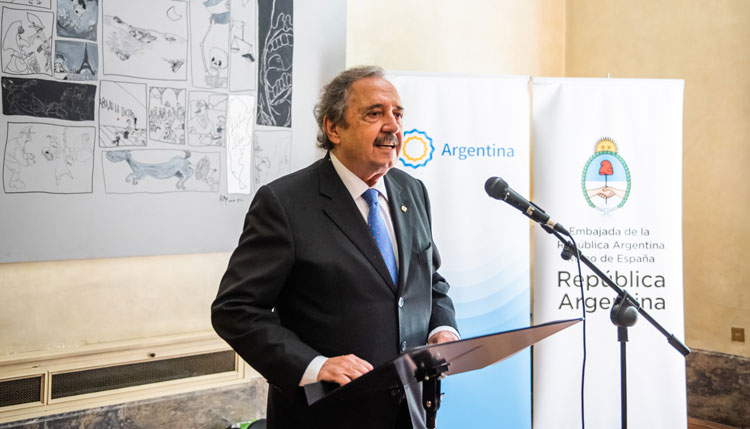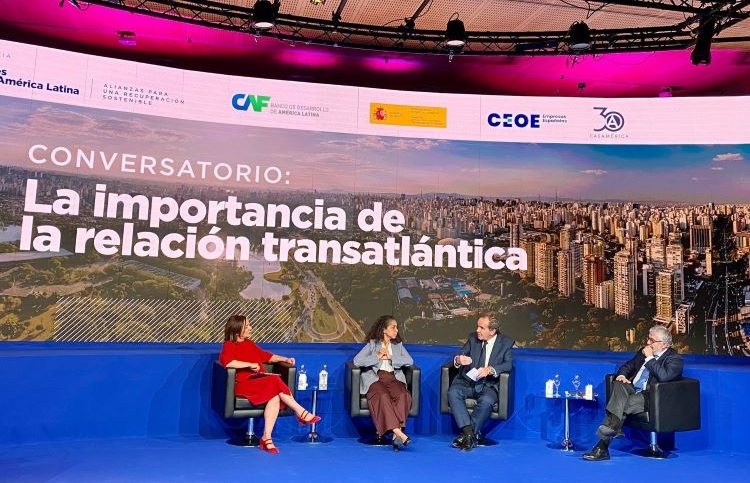Juan David Latorre
The residence of the Ambassador of Argentina, Ricardo Alfonsín, was the setting for the celebration last Wednesday of the 212th Anniversary of the May 25th Revolution in Buenos Aires.
The May mandate is an ethical mandate,” Ambassador Ricardo Alfonsín pointed out. Of course I know that politics and ethics are different things, they are not the same thing. But since politics is a human endeavour, since politics is a human action, it can be evaluated from an ethical point of view. And the legacy of the revolutionaries of May is an ethical view of the organisation of society. Let us celebrate in the present the ideology that inspired the revolutionaries of that time.”
“And there are two values, the ambassador continued, that synthesise that ethical conception that gave content to the ideology of May and that were collected in our patriotic song: sacred liberty and noble Equality.”
The Argentine ambassador recalled the words of President Alberto Fernández during his recent visit to Spain, in which he said that in the face of the dramatic times the world is going through, “Argentina is ready to do whatever is necessary to contribute to peace in the world.” But he also pointed out that “I would not do anything that I would think could produce the opposite effects, that I would not do anything that would be an obstacle to achieving peace in the world”.
Addressing the Argentinean community living in Spain, Ambassador Ricardo Alfonsín, referred to the problems currently facing his country and the objectives that lie ahead. He expressed his opinion that “Argentina needs to make a second transition, after the one made after the dictatorship. This transition would have been impossible if there had not been an essential agreement of majority support from all the social and political forces in Argentina. Today, in this second transition, we must aim to achieve development. Not being a developed country means that there are people who suffer the consequences. So we have the need and the obligation to start on the road to development. Growth is not the same as development. But this second transition will be very difficult if we are not able to reach essential agreements. History shows that the times when very complex situations were overcome were times when there were important and essential agreements between the different forces in society and between the main economic and social factors. If we do not put an end to intolerance, to always blaming the other, those who think differently, if we are not capable of recognising our own mistakes, if we act with the attitude that we are the owners of the truth, these agreements will be very difficult.
“If we are not capable,” concluded Ambassador Ricardo Alfonsín, “of putting the general interest above sectoral, political, economic or whatever interests, if it is emotion rather than reason that determines our political positions, it will be very difficult to advance towards the constitution of essential agreements that will allow us to move towards a path in which we can gradually achieve the conditions for development. This is not an easy task, nor does it belong only to politicians, but to each and every citizen”.
The celebration was attended, among others, by the ambassadors of Costa Rica, Haiti, Lithuania, Hungary, Armenia, Italy, Brazil, Greece and Azerbaijan, as well as members of the delegations of the United States, Egypt and Paraguay, together with personalities such as Andrés Allamand, the Ibero-American Secretary General and the chairman of the Foreign Affairs Committee of the Spanish Parliament, Pau Mari-Klose. Also present were the Deputy Director General for Mercosur Countries at the Ministry of Foreign Affairs, Enrique Yturriaga, and the Director of the Diplomatic School, Alberto Antón.











